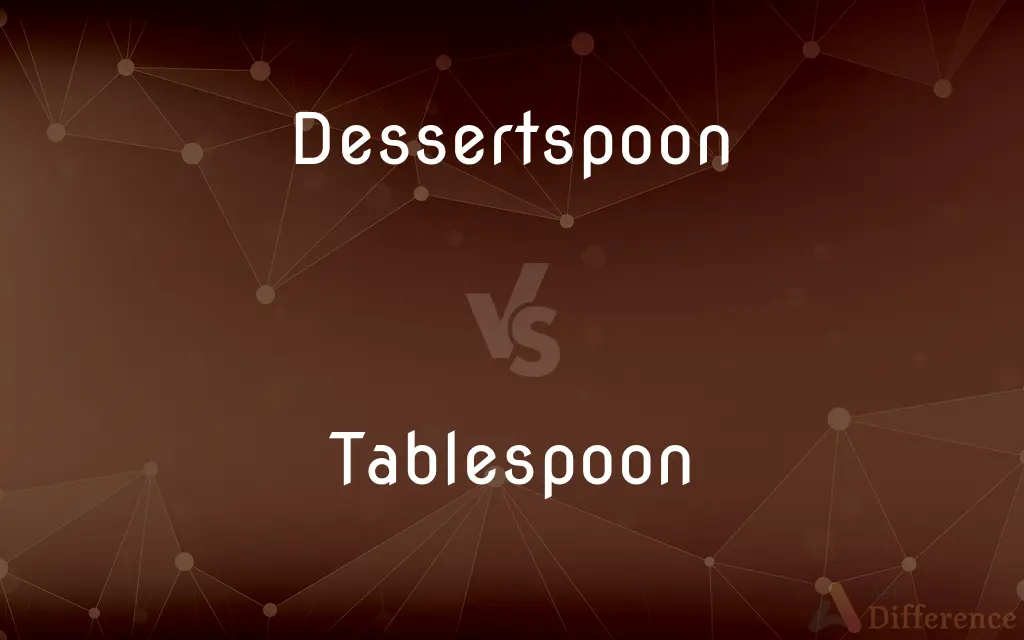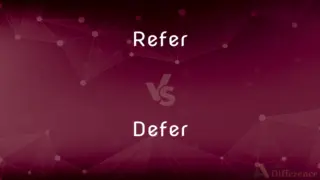Dessertspoon vs. Tablespoon — What's the Difference?
By Tayyaba Rehman — Updated on May 27, 2024
A dessertspoon typically holds half the volume of a tablespoon, with both being measures of volume or serving utensils.

Difference Between Dessertspoon and Tablespoon
Table of Contents
ADVERTISEMENT
Key Differences
The dessertspoon and tablespoon are both kitchen utensils and units of measure, but they differ in size and common usage. A dessertspoon, often used for consuming or serving desserts, holds a volume typically half that of a tablespoon. The tablespoon, on the other hand, is a more common measure in American recipes, and it denotes a larger volume, often used for main ingredients or for serving.
When considering the utensils themselves, the dessertspoon is often designed with a slightly elongated bowl, perfect for scooping soft desserts or drizzling sauces. The tablespoon, conversely, is broader and more rounded, making it ideal for scooping up larger portions of food.
In the world of culinary arts, precision matters. Hence, it's crucial to know the difference between a dessertspoon and a tablespoon. Using one in place of the other could alter the outcome of a recipe. For instance, using a tablespoon of salt instead of a dessertspoon would result in a much saltier dish.
The definitions of dessertspoon and tablespoon may vary slightly depending on the country or region. While a dessertspoon generally holds half the volume of a tablespoon, exact measurements might differ internationally.
Comparison Chart
Volume (approx.)
10 milliliters (in UK)
15 milliliters (in US & UK)
ADVERTISEMENT
Primary Usage
Serving and consuming desserts
Serving food, measuring in recipes
Shape
Elongated bowl
Broader, rounded bowl
Common in Recipes of
UK, older recipes
US recipes
Relative Size
Smaller
Larger
Compare with Definitions
Dessertspoon
A measure of volume, typically half that of a tablespoon.
Add two dessertspoons of honey to the mixture.
Tablespoon
A standard measure of volume used in cooking, larger than a teaspoon.
Add one tablespoon of olive oil to the pan.
Dessertspoon
A utensil smaller than a tablespoon, used for eating desserts.
She used a dessertspoon to enjoy her pudding.
Tablespoon
A large spoon used for serving or eating food.
He served himself a heap of mashed potatoes with a tablespoon.
Dessertspoon
A spoon intermediate in size between a tablespoon and a teaspoon, used for eating dessert.
Tablespoon
A utensil with a broad, rounded bowl.
She stirred her coffee with a tablespoon.
Dessertspoon
A unit of measure, being equivalent to two teaspoons or two-thirds of a tablespoon, or approximately 10 millilitres; a dessertspoonful.
Tablespoon
A common measure in American recipes.
The recipe requires three tablespoons of sugar.
Dessertspoon
More generally, that volume of a substance which is contained within a dessert spoon.
Tablespoon
A tablespoon is a large spoon. In many English-speaking regions, the term now refers to a large spoon used for serving; however, in some regions, it is the largest type of spoon used for eating.
Dessertspoon
(rare) An item of cutlery; a spoon, larger than a teaspoon and smaller than a tablespoon, used for eating dessert.
Tablespoon
Abbr. T or tbs. or tbsp. A household cooking measure equal to 3 teaspoons, or 1/2 fluid ounce (15 milliliters). See Table at measurement.
Dessertspoon
An elongated spoon designed for scooping and consuming soft desserts.
The ice cream was served with a delicate dessertspoon.
Tablespoon
(cooking) A unit of volume, the value of which varies regionally; in the US: three teaspoons or one half fluid ounce or roughly 15 ml; in Britain and Canada: exactly 15 ml; in Russia 18 ml; in Australia: four teaspoons or 20 ml.
Dessertspoon
A serving tool often used for drizzling sauces or syrups.
With a steady hand, she used the dessertspoon to drizzle caramel over the cake.
Tablespoon
A spoon of the largest size commonly used at the table; - distinguished from teaspoon, dessert spoon, etc.
Dessertspoon
A common measure in older or UK recipes.
The old recipe called for a dessertspoon of vanilla extract.
Tablespoon
As much as a tablespoon will hold
Dessertspoon
As much as a dessertspoon will hold
Tablespoon
The largest spoon in a standard cutlery set.
Among the set of spoons, the tablespoon was the most robust.
Tablespoon
A large spoon for serving food.
Tablespoon
A large spoon, used for eating food from a bowl.
Tablespoon
A spoon too large for eating, usually used for cooking or serving.
Tablespoon
A spoon larger than a dessert spoon; used for serving
Common Curiosities
Can I use a tablespoon in place of a dessertspoon in recipes?
No, using a tablespoon would typically double the intended amount.
Is a tablespoon the same worldwide?
While generally larger than a dessertspoon, exact tablespoon sizes can vary by country.
What's the primary purpose of a dessertspoon?
A dessertspoon is mainly used for serving or eating desserts.
Are these measures the same for all types of ingredients?
No, the volume is consistent, but the weight of ingredients can vary.
Why is the tablespoon more common in American recipes?
The tablespoon is a standard measure in American culinary practices, while the dessertspoon is more common in the UK.
How many dessertspoons make a tablespoon?
Typically, two dessertspoons equal one tablespoon.
Are dessertspoons and tablespoons used outside of the kitchen?
Primarily, their use is culinary, but they might occasionally serve decorative or artistic purposes.
How precise should I be with these measurements in baking?
Precision is crucial in baking; always use the correct measure.
Can I measure liquid and solid ingredients with these spoons?
Yes, but the weight and volume will differ based on the ingredient's density.
What's the relation between teaspoons, dessertspoons, and tablespoons?
Generally, 2 teaspoons equal a dessertspoon, and 2 dessertspoons equal a tablespoon.
Share Your Discovery

Previous Comparison
Test vs. Experiment
Next Comparison
Refer vs. DeferAuthor Spotlight
Written by
Tayyaba RehmanTayyaba Rehman is a distinguished writer, currently serving as a primary contributor to askdifference.com. As a researcher in semantics and etymology, Tayyaba's passion for the complexity of languages and their distinctions has found a perfect home on the platform. Tayyaba delves into the intricacies of language, distinguishing between commonly confused words and phrases, thereby providing clarity for readers worldwide.














































